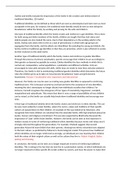Outline and briefly evaluate the importance of the family in the creation and reinforcement of
traditional identities. (20 marks)
Traditional identities can be defined as those which are seen as stereotypical and were seen as most
acceptable in the past, for instance, the traditional male identity would be seen as men being the
breadwinner within the family, by working and proving for the wife and children.
One type of traditional identity which the family creates and reinforces is age identities. This is done
for both young and older members of the family; children are taught that they lack status and
elderly people are also treated the same, due to their dependency on the working adults in the
family. Hockey and James refer to this as a lack of personhood, in which both age groups are
segregated from the family, and the elderly are infantilised. By excluding the young and elderly, the
family reinforce traditional age identities in that they are powerless, which is also reflected in society
by their exclusion to the adult world.
Another type of traditional identity which the family creates and reinforces is gender identities.
Through the process of primary socialisation, parents encourage their children to act accordingly to
their gender as deemed acceptable by society. Oakley identifies the four methods in which this is
carried out; manipulation, verbal appellations, canalization and different activities. Girls are
encouraged to wear pink and play with dolls, whilst boys are made to wear blue and play outdoors.
Therefore, the family is vital to maintaining traditional gender identities which determine the future
roles the children grow up to take on; boys become breadwinner males and girls become
housewives. Parsons- Functionalist view- expressive and instrumental
However, the family can now be seen as creating new gender identities as opposed to reinforcing
traditional ones. This is because society has evolved and led to the acceptance of new identities,
meaning the strict stereotypes no longer dictate how individuals socialise their children. For
instance, Connell recognises the emergence of four types of masculinity; hegemonic, complicit,
marginalised and subordinate. This means that there is now a range of possibilities of how children
can be raised, so the family can actually help break down traditional identities and encourage new
ones.
A final type of traditional identity which the family creates and reinforces is ethnic identity. This can
be seen most evidently in Asian families, where the norms, values and traditions of their specific
culture are passed down to their children. An example of this was looked at by Ghumann, who
recognised how Asian children are socialised into the extended family, with high emphasis placed on
loyalty, honour and religious commitment. This was also supported by Bhatti who discussed the
importance of ‘izzat’ within Asian families. However, the family can be seen as less important in
modern society in terms of reinforcing traditional ethnic identities because norms and values aren’t
strongly enforced throughout the generations. For example, Modood suggests that second
generation Asians felt more British than their parents, showing how ethnic minorities have adapted
to the host culture, as predicted by Patterson’s host-immigrant model. This proves how traditional
ethnic identities are no longer reinforced as strongly, as individuals are now teaching their children
both the values of their original culture as well as the culture they live in. Mahal- Hinglish. Butler-
picking and choosing
In conclusion, the family can be seen as no longer important in terms of reinforcing traditional
identities. This is owing to the fact that we now live in a postmodern society, in which individuals are
no longer required to follow specific life scripts written by society, and have the power to make their




